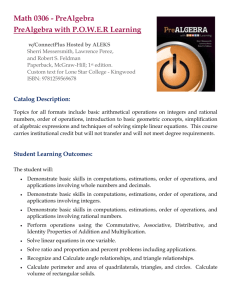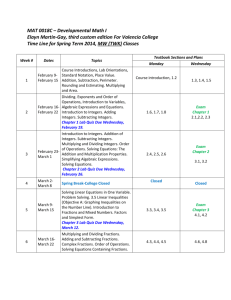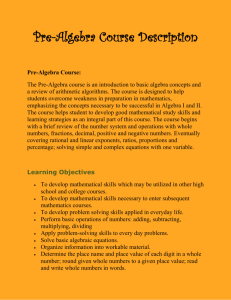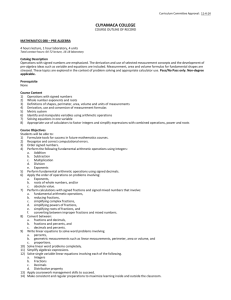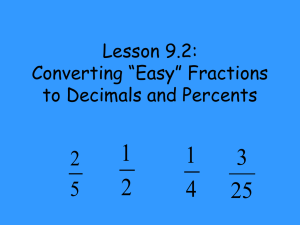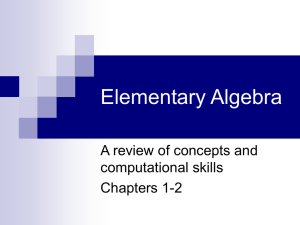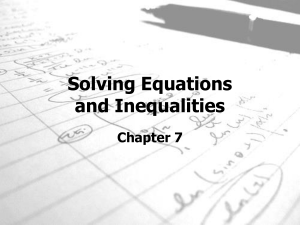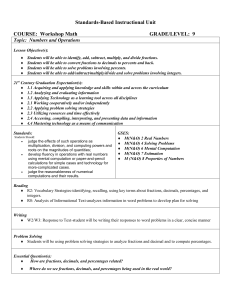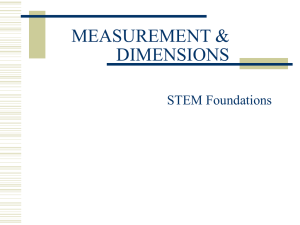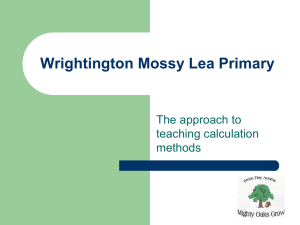OAKTON COMMUNITY COLLEGE GENERIC COURSE SYLLABUS
advertisement
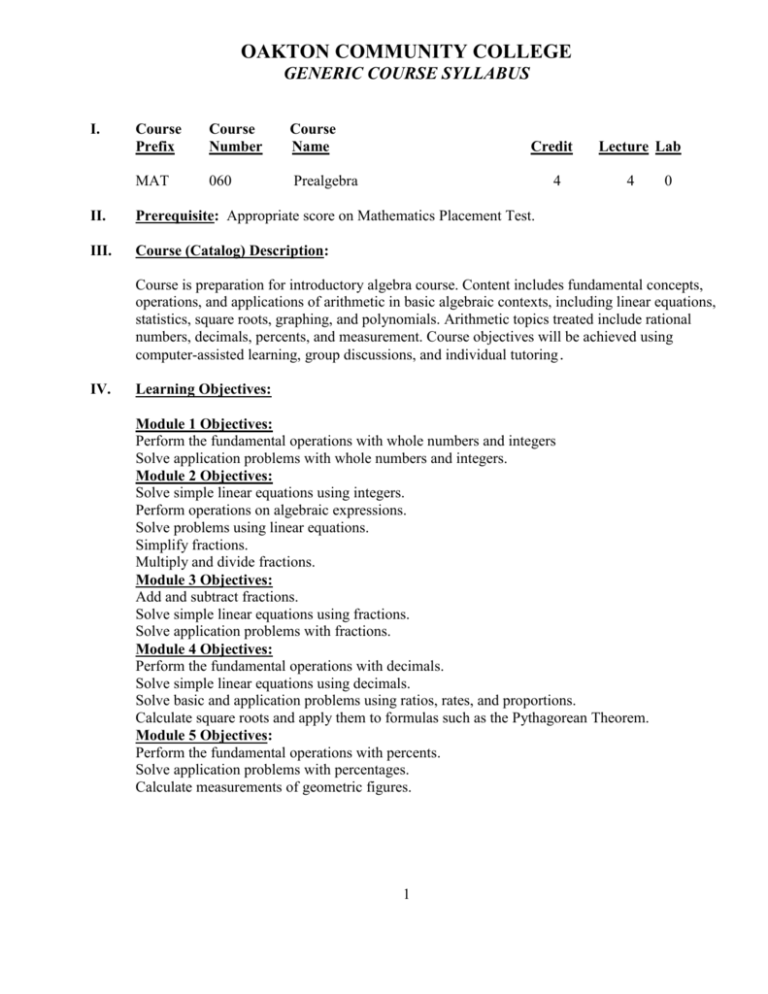
OAKTON COMMUNITY COLLEGE GENERIC COURSE SYLLABUS I. Course Prefix Course Number Course Name MAT 060 Prealgebra Credit 4 II. Prerequisite: Appropriate score on Mathematics Placement Test. III. Course (Catalog) Description: Lecture Lab 4 0 Course is preparation for introductory algebra course. Content includes fundamental concepts, operations, and applications of arithmetic in basic algebraic contexts, including linear equations, statistics, square roots, graphing, and polynomials. Arithmetic topics treated include rational numbers, decimals, percents, and measurement. Course objectives will be achieved using computer-assisted learning, group discussions, and individual tutoring. IV. Learning Objectives: Module 1 Objectives: Perform the fundamental operations with whole numbers and integers Solve application problems with whole numbers and integers. Module 2 Objectives: Solve simple linear equations using integers. Perform operations on algebraic expressions. Solve problems using linear equations. Simplify fractions. Multiply and divide fractions. Module 3 Objectives: Add and subtract fractions. Solve simple linear equations using fractions. Solve application problems with fractions. Module 4 Objectives: Perform the fundamental operations with decimals. Solve simple linear equations using decimals. Solve basic and application problems using ratios, rates, and proportions. Calculate square roots and apply them to formulas such as the Pythagorean Theorem. Module 5 Objectives: Perform the fundamental operations with percents. Solve application problems with percentages. Calculate measurements of geometric figures. 1 V. Academic Integrity: Students and employees at Oakton Community College are required to demonstrate academic integrity and follow Oakton’s Code of Academic Conduct. This code prohibits: cheating, plagiarism (turning in work not written by you, or lacking proper citation), falsification and fabrication (lying or distorting the truth), helping others to cheat, unauthorized changes on official documents, pretending to be someone else or having someone else pretend to be you, making or accepting bribes, special favors, or threats, and any other behavior that violates academic integrity. There are serious consequences to violations of the academic integrity policy. Oakton’s policies and procedures provide students a fair hearing if a complaint is made against you. If you are found to have violated the policy, the minimum penalty is failure on the assignment and, a disciplinary record will be established and kept on file in the office of the Vice President for Student Affairs for a period of 3 years. Details of the Code of Academic Conduct can be found in the Student Handbook. VI. Sequence of Topics: Module 1 (No Calculator) Whole Numbers and Integers 1. Place Value, Names for Numbers, Rounding 2. Dividing Whole Numbers and Introduction to Exponents 3. Introduction to Variables, Expressions and Equations 4. Introduction to integers 5. Adding and Subtracting Integers 6. Multiplying and Dividing Integers 7. Order of Operations Module 2 (No Calculator) Algebraic Equations and Introduction to Fractions 1. Solving Simple Linear Equations using the Addition and Multiplication Properties 2. Simplifying Expressions 3. Solving Linear Equations in One Variable 4. Applications Using Linear Equations 5. Introduction to Fractions 6. Factors and Simplest Form 7. Multiplying and Dividing Fractions Module 3 (No Calculator) Addition and Subtraction of Fractions and Applications 1. Adding and Subtracting Like Fractions, LCD 2. Adding and Subtracting Unlike Fractions 2 3. Order of Operations with Fractions 4. Operations on Mixed Numbers 5. Solving Equations with Fractions Module 4 Decimals and Ratios/Proportions 1. Understanding Decimals, Ratios and Rates 2. Place Value: Reading and Writing Decimal Numerals 3. Comparing and Ordering 4. Rounding and Estimating 5. Adding and Subtracting 6. Multiplying and Dividing 7. Conversions: Fractions, Mixed Numerals, Decimals 8. Solving Equations using Decimals 9. Proportions and Problem Solving 10. Square Roots and the Pythagorean Theorem Module 5 Percents and Geometry Review 1. Understanding percent 2. Conversions: fractions, decimals, percent 3. Solving percent problems using equations 4. Perimeter 5. Area, Volume and Surface Area 6. Applications VII. Methods of Instruction: Methods of instruction include one-on-one and/or small group discussion, and required website ancillaries. Calculators/computers will be used for modules 4 and 5 only. Course may be taught as face-to-face, media-based, hybrid or online course. VIII. Course Practices Required: Mathematics 060, 070 and 110 are sequential courses utilizing a classroom instructor and an interactive computer website. Students are required to attend scheduled class hours. Students may be dropped from the course upon excessive class absences. Each course is divided into five modules. Every homework section must be completed with a score of 100%, every quiz must be completed with a minimum score of 70% and every module posttest must be completed with a minimum score of 70%. Each of the first four modules must be completed with the minimal posttest score to proceed to the final module for the course. All course work must be completed in a notebook. Students may complete a course at any time during the semester. Upon completion of a course, the student can start the next sequential course. A new access code must be purchased at that time. If all modules of a course are not successfully completed within a semester, the student can 3 re-enroll in the same course the following semester beginning with their first uncompleted module. Use of calculators will be prohibited for the first three modules. IX. Instructional Materials: There is a required website in mymathlabsplus for this course. The required code for this can be purchased in the bookstore or directly on the website using a credit card. Note: Current textbook information for each course and section is available on Oakton's Schedule of Classes. Within the Schedule of Classes, textbooks can be found by clicking on an individual course section and looking for the words "View Book Information". Textbooks can also be found at our Mathematics Textbooks page. A scientific calculator, notebook, and earphones are required. X. Methods of Evaluating Student Progress: As determined by department and individual instructor. XI. Other Course Information: If you have a documented learning, psychological, or physical disability you may be entitled to reasonable academic accommodations or services. To request accommodations or services, contact the Access and Disability Resource Center at the Des Plaines or Skokie campus. All students are expected to fulfill essential course requirements. The College will not waive any essential skill or requirement of a course or degree program. ___________________________________________________________________________ Other Information: Effective beginning term: _Spring 2015___________ (term) (year) Syllabus prepared by: _ J. Canfield _ A.Hammer, O.Cedrina end term _N/A______ (term) (year) Date _Oct 31, 2014_______ Reviewed by Dept/program chair: Jennifer Strehler______ Date Approved by Dean: _Bob Sompolski___________ _ Oct 31, 2014 ______ Date __ Oct 31, 2014 _____ 4
